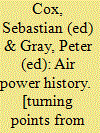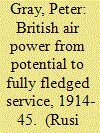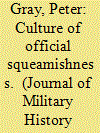| Srl | Item |
| 1 |
ID:
051066


|
|
|
|
|
| Publication |
London, Frank Cass, 2002.
|
| Description |
xix, 362p.
|
| Series |
Studies in air power
|
| Standard Number |
0714682578
|
|
|
|
|
|
|
|
|
|
|
|
Copies: C:1/I:0,R:0,Q:0
Circulation
| Accession# | Call# | Current Location | Status | Policy | Location |
| 048001 | 358.4009/COX 048001 | Main | On Shelf | General | |
|
|
|
|
| 2 |
ID:
133799


|
|
|
|
|
| Publication |
2014.
|
| Summary/Abstract |
The First World War set British air power on a path of development that by 1939 made an essential contribution to the conduct of war
At the start of the First World War, the potential of air power for military purposes had already been identified but remained largely underdeveloped, with Britain lagging behind some of its direct European competitors. Peter Gray traces how the First World War acted as a catalyst for British forces to use air power in attack and reconnaissance roles, and unleashed the potential for its further development during the interwar years. By the Second World War, air power had become an indispensable element of warfare.
|
|
|
|
|
|
|
|
|
|
|
|
|
|
|
|
| 3 |
ID:
125193


|
|
|
|
|
| Publication |
2013.
|
| Summary/Abstract |
Although it waged the largest and most costly of Britain's Second World War campaigns, RAF Bomber Command was not mentioned in Prime Minister Churchill's 1945 Victory Speech and its Commander-in-Chief, Air Chief Marshal Sir Arthur Harris, was left off the Victory Honours List. The crowning insult to Bomber Command veterans was the lack of a campaign medal for the strategic air offensive. This article uses case studies of the campaign medal saga, still very much alive today, and the perceived reluctance of the wartime Air Ministry to acknowledge the RAF's resort to area bombing to test the argument of some historians that this slight of Bomber Command was due to "official squeamishness" in the Air Ministry and elsewhere in the government in the aftermath of the bombing of Dresden.
|
|
|
|
|
|
|
|
|
|
|
|
|
|
|
|